Best Practices of the 2022 Top Green Fleets in North America
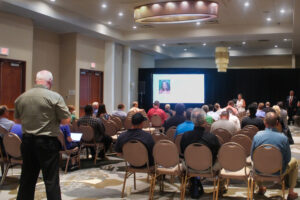 At the end of August during the 2022 Sustainable Fleet Technology Conference, the NAFA Fleet Management Association (NAFA) announced this year’s winners of the Green Fleet Awards to honor fleets who have enhanced practices to make a positive impact on the environment. The North Carolina Clean Energy Technology Center (NCCETC) is a proud sponsor of the Green Fleet Awards, now in its 15th year of recognizing peak-performing fleet sustainability efforts.
At the end of August during the 2022 Sustainable Fleet Technology Conference, the NAFA Fleet Management Association (NAFA) announced this year’s winners of the Green Fleet Awards to honor fleets who have enhanced practices to make a positive impact on the environment. The North Carolina Clean Energy Technology Center (NCCETC) is a proud sponsor of the Green Fleet Awards, now in its 15th year of recognizing peak-performing fleet sustainability efforts.
NCCETC hosted a Sustainable Fleet Technology (SFT) Webinar session – The Best Practices of the Top Green Fleets 2022 – following the announcement. Rick Sapienza of NCCETC and NAFA’s Chief Executive Officer Bill Schankel joined three of the top five Green Fleets to share their best practices to implement clean transportation technologies and strategies.
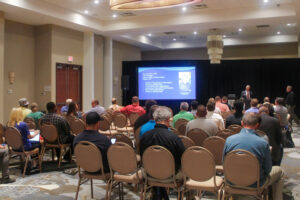
Sapienza encouraged fleets to apply for the contest at the beginning of the webinar. The Green Fleet Awards is free to enter and is open to both government and commercial fleets in North America. “In terms of sustainability, my advice is just to get started,” said Sapienza. “And in terms of applying for the awards, it’s a good exercise- you will certainly learn something new.”
Judging criteria includes dedicated alternative fuel and hybrid vehicle composition, fuel usage, fuel savings, purchasing policy, long-range planning, and other areas. Green Fleets judge Gary Lentsch of Eugene Water & Electric Board and Rick Sapienza discussed tips for those interested in applying for the awards during the webinar. “In the end, really, we’re looking for results,” Lentsch explained.
AND THE WINNER IS…
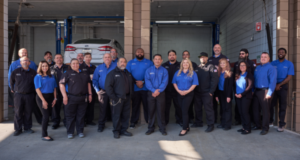 The City of Riverside, California was recognized as the number one Green Fleet and the judges noted their application was a standout among the others.
The City of Riverside, California was recognized as the number one Green Fleet and the judges noted their application was a standout among the others.
According to Sapienza, fleets should have policies and procedures in place to support their goals like green purchasing policies and idle reduction to ensure they can achieve their sustainability goals. In the City of Riverside, one of the goals of their 2025 strategic plan is to decrease Riverside’s carbon footprint by acting urgently to reach a zero-carbon electric grid and implement the requisite measures to achieve citywide carbon neutrality no later than 2040.
Overall, the City of Riverside demonstrated a variety of alternative fuel vehicles and usage, with 62 percent of all fuel used being alternative and 42 percent of the fleet being alternative fuel vehicles. Riverside’s fleet also has two grant funded projects currently underway to support projects for facility updates and alternative fuel island infrastructure improvements and expansion.
Michael Turnbull has been with the City of Riverside since 2010 and has held a variety of roles in their Fleet Management Division before recently becoming the Maintenance Service Manager. “We follow a clean, green approach,” said Turnbull. “When replacing vehicles that have reached the end of their life cycle, they’re always replaced with ultra low emission, fuel efficient vehicles including hybrids, but preferably alternative fuel vehicles such as compressed natural gas, propane, flex fuel and, even better, electric vehicles.”
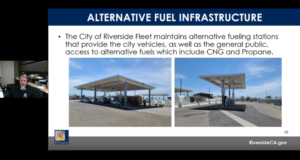
Under the 2025 strategic plan, it is also stated that Fleet Management analysts regularly run reports to monitor vehicle usage and determine right sizing for the entire city’s fleet. “They help determine whether or not specific vehicles are being used efficiently or if reassignment or surplus of the vehicle is justified,” Turnbull said.
As far as infrastructure to support these alternative fuel vehicles, the City of Riverside Fleet maintains two alternative fueling stations that provide the city as well as the general public with access to alternative fuels including compressed natural gas and propane.
IT ALL STARTS WITH A GOAL
“I’ve now been with our fleet division for 34 years and these are the things that I’ve found work- first of all, start with a goal,” said John Hyatt from the City of Fort Collins which was awarded fifth place in the 2022 Green Fleet Awards. Hyatt added, “You need to have a goal that is very clean and hopefully achievable.”
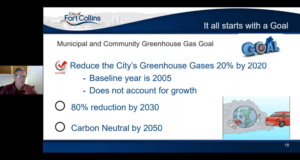
Hyatt also underscored the importance of developing policies to support those goals, especially when coordinating with different departments within the City of Fort Collins. Fort Collins’ Vehicle Purchasing Policy prioritizes purchasing alternative fuel vehicles for all new and replacement vehicles in the city’s fleet.
Fleets trying to improve sustainability can benefit from coordinating with other departments to support their goals, too. “I have several other departments that are all on board,” said Hyatt, “and they’re helping us carry that torch to achieve greenhouse gas reduction.”
Diversifying methodologies and technologies was emphasized throughout the webinar discussion. “There is not one single fuel that’s going to accomplish your goals, so I encourage all fleets to diversify as much as you can,” Hyatt stated.
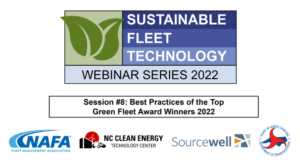 Sapienza agreed that building towards a sustainable fleet is a multi-aspect process that involves planning, understanding, learning, tracking, analyzing, training and changing organizational culture. NCCETC hosts SFT Webinars to serve as a resource for fleets by providing tools, tips and strategies they can use in their operations the next day. View past presentations and sessions from the 2022 SFT Webinar Series and register for upcoming webinars online now.
Sapienza agreed that building towards a sustainable fleet is a multi-aspect process that involves planning, understanding, learning, tracking, analyzing, training and changing organizational culture. NCCETC hosts SFT Webinars to serve as a resource for fleets by providing tools, tips and strategies they can use in their operations the next day. View past presentations and sessions from the 2022 SFT Webinar Series and register for upcoming webinars online now.
THE TOP 10 BEST FLEETS IN THE AMERICAS:
- City of Riverside, CA
- City of Long Beach, CA – Fleet Services
- City of Dublin, OH
- Denver International Airport (CO)
- City of Fort Collins, CO
- King County, WA – Fleet Services
- Atlantic County, NJ – Utilities Authority
- Salt River Project (AZ)
- City and County of Denver, CO – Department of Transportation – Fleet Management
- UCI Irvine Transportation Services (CA)
If you’re interested in learning more about the Green Fleets Award program or how to apply for the 2023 program, visit NAFA’s website by clicking here.